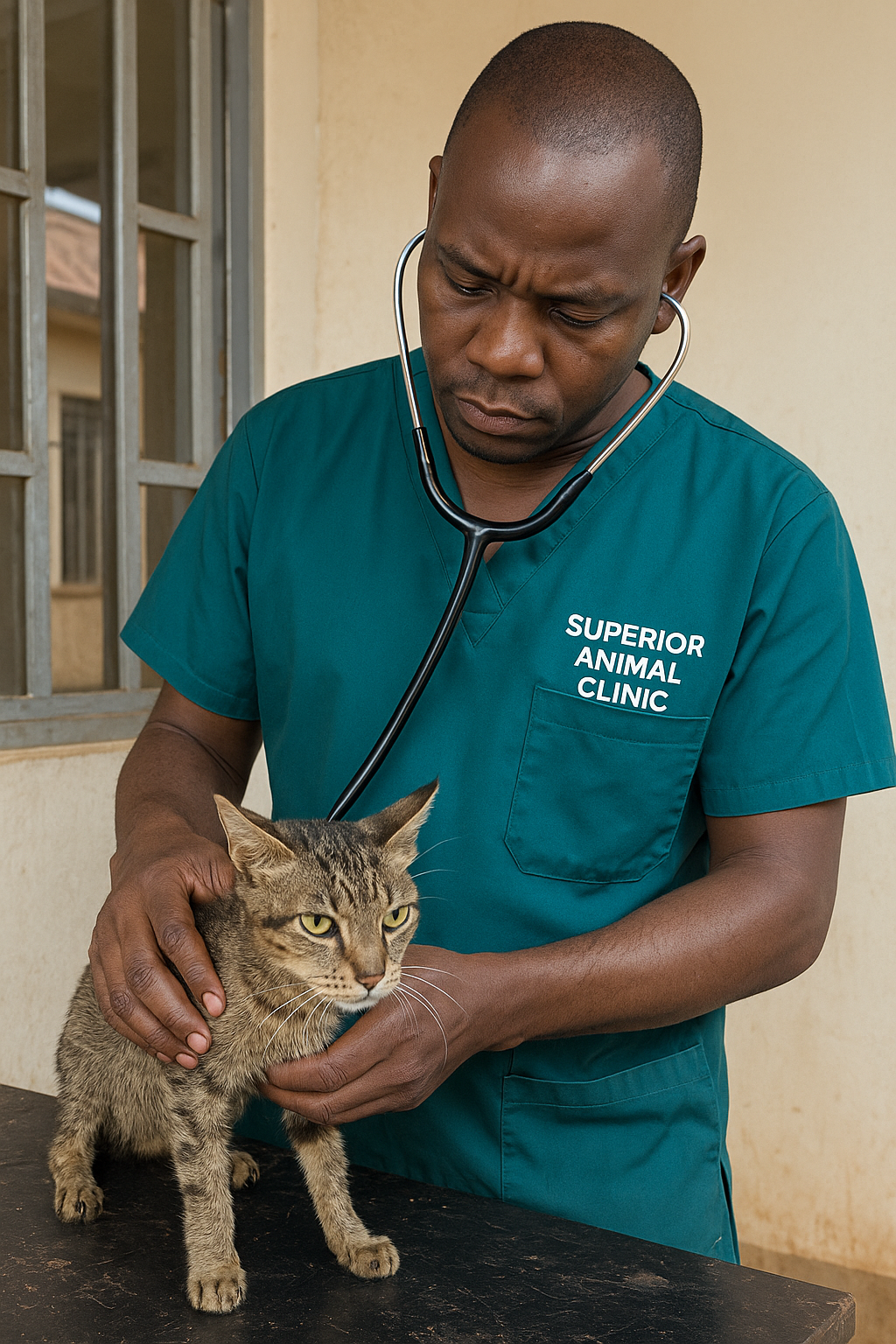
Has your cat started looking thinner, weaker, or less playful than before? Many cat owners in Kampala, Uganda, worry when their cats suddenly lose weight, even when they seem to be eating normally. Weight loss in cats can happen slowly or very quickly, and it’s often a sign that something more serious is going on inside your pet’s body.
At Superior Animal Clinic in Makindye along Salaama Road, we help cat owners every day from areas like Ntinda, Old Kampala, Kasubi, Nsambya, Katwe, Zana, Nakasero, Mityana, Buziga, Munyonyo, Nakawa, Rubaga, Muyenga, Naguru, Bugolobi, Kabowa, Kabojja, Lugogo, Lubowa, Seguku, Ndejje, Kololo, Mutundwe, Bukoto, Bulindo, and Kulambiro who bring in cats struggling with unexplained weight loss.
This article will guide you through the common causes of cat weight loss in Uganda, the best treatments available, home care tips, and why Superior Animal Clinic is the number one veterinary clinic in Kampala for diagnosing and treating cats with weight loss.
Why Is My Cat Losing Weight? – Common Causes in Kampala
When your cat starts to lose weight, it can be worrying and confusing. Many cat owners in Kampala and surrounding areas ask us at Superior Animal Clinic: “Why is my cat getting thinner even when it eats?” or “My cat has stopped eating, what could be wrong?”
The truth is, cat weight loss is not a disease on its own—it’s a sign that something else is happening in your cat’s body. At Superior Animal Clinic, Makindye, we see several common causes among cats brought in from places like Ntinda, Muyenga, Kololo, Bugolobi, Nsambya, Zana, and Kasubi.
Here are the main reasons cats lose weight in Kampala:
1. Intestinal Parasites (Worms)
One of the leading causes of weight loss in cats in Uganda is worms. Even cats that look healthy can carry roundworms, tapeworms, or hookworms, which steal nutrients from their food. Outdoor cats in Katwe, Kasubi, Mutundwe, and Ndejje are especially at risk.
2. Poor Nutrition and Unbalanced Diets
Many cats in Kampala are fed mainly on leftovers, posho, or fish bones. While this fills their stomach, it does not provide the essential nutrients cats need, leading to gradual weight loss, dull coats, and weakness.
3. Infections (Bacterial, Viral, and Fungal)
Cats suffering from chronic respiratory infections, mouth infections, or viral diseases often lose weight because they feel too sick or painful to eat. We frequently diagnose this in cats from densely populated areas like Old Kampala, Katwe, and Rubaga.
4. Kidney and Liver Diseases
Older cats in Kololo, Muyenga, and Naguru often come in with kidney or liver disease. These conditions cause loss of appetite, excessive drinking, and steady weight loss.
5. Diabetes and Hyperthyroidism
Though less common, diabetes and thyroid problems are on the rise in middle-aged and senior cats in Kampala. These conditions can make a cat eat more but still lose weight quickly.
6. Stress and Environmental Changes
Cats are sensitive animals. Moving houses, loud noises, or introducing new pets can cause stress, leading to appetite loss and weight drop. We often see this in indoor cats from Bugolobi, Ntinda, and Buziga.
7. Cancer and Other Serious Diseases
While not very common, some cats develop tumors that cause rapid, unexplained weight loss. Early veterinary check-ups are key to catching these conditions in time.
8. Dental and Mouth Problems
Cats with painful teeth, gum infections, or mouth ulcers often refuse to eat because chewing is uncomfortable. We see many cases of feline dental disease in cats from Bugolobi, Ntinda, and Nsambya, where owners report their cats try to eat but then drop food or cry while chewing.
9. Chronic Pain and Injuries
Cats suffering from untreated injuries, arthritis, or hidden abscesses may eat less due to constant pain. Outdoor cats in Kasubi, Katwe, and Mutundwe are especially vulnerable to injuries that cause gradual weight loss.
10. Gastrointestinal Disorders
Conditions like inflammatory bowel disease (IBD) or stomach ulcers can interfere with nutrient absorption. Cats may vomit, have diarrhea, and lose weight despite eating well.
11. Feline Immunodeficiency Virus (FIV) and Feline Leukemia Virus (FeLV)
These viral infections, common in unvaccinated outdoor cats in Kampala, weaken the immune system and often lead to chronic weight loss, recurring infections, and poor appetite.
12. Hormonal and Metabolic Disorders
Apart from diabetes and thyroid disease, cats can develop other metabolic conditions that affect how their bodies use food. These usually appear in middle-aged and senior cats.
13. Stress-Related Anorexia
Cats that are left alone for long hours, relocated to noisy neighborhoods, or introduced to new pets may develop stress-induced anorexia. This is especially common in urban households in Lugogo, Munyonyo, and Nakawa.
14. Food Intolerance or Allergies
Some cats in Kampala react poorly to certain proteins, dairy, or fish, leading to digestive upsets, diarrhea, and weight loss.
15. Environmental Toxins and Poisoning
Accidental poisoning from rat poison, toxic plants, or contaminated food can cause vomiting, diarrhea, and sudden weight loss. Cats in urban Kampala areas are particularly at risk because of exposure to household chemicals.
✅ At Superior Animal Clinic, we always remind cat owners that any weight loss in a cat should never be ignored. With proper veterinary tests, we can quickly find the cause—whether it’s something simple like worms, or more complex like kidney disease—and start the right treatment.
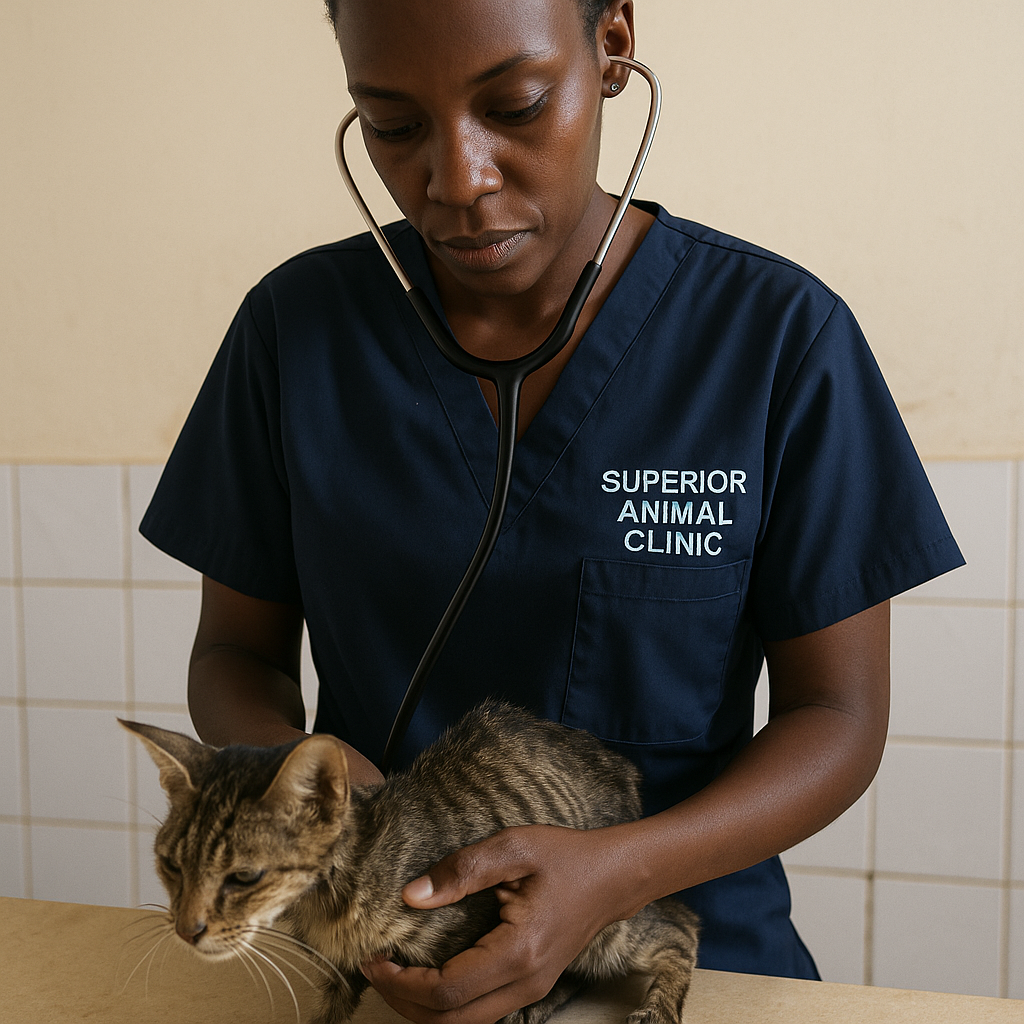
Predisposing Factors – Cats Most at Risk
Some cats in Uganda are more prone to weight loss, including:
- Outdoor cats – More exposed to parasites and infections.
- Older cats – Often face chronic illnesses like kidney or thyroid disease.
- Unvaccinated cats – Higher risk of viral infections.
- Cats fed on leftovers only – Miss essential nutrients.
What Happens If You Don’t Treat Cat Weight Loss? (Prognosis)
If left untreated, cat weight loss can lead to:
- Severe malnutrition
- Weakness and anemia
- Organ failure
- Shortened lifespan
Early veterinary care at Superior Animal Clinic greatly improves recovery chances.
How We Treat Cat Weight Loss at Superior Animal Clinic – Step by Step
At Superior Animal Clinic, Kampala, we use a comprehensive treatment plan:
- Full veterinary examination – Checking gums, eyes, weight, and hydration.
- Laboratory tests – Blood work, stool exam for worms, urine tests, X-rays, or ultrasound.
- Deworming and parasite control – Using drugs like albendazole, praziquantel, ivermectin, or Simparica for fleas/ticks.
- Antibiotics and antifungals – If infections are detected.
- Supportive care – IV fluids, vitamins, and appetite stimulants like mirtazapine or cyproheptadine.
- Special diets – High-calorie cat food such as Royal Canin Recovery, Hill’s a/d, or available Ugandan brands.
- Monitoring and follow-up – Regular weight checks and progress reviews.
Home Remedies for Cat Weight Loss in Uganda
While veterinary treatment is key, you can support your cat at home by:
- Feeding boiled fish, chicken, or liver (soft, easy to eat).
- Offering kitten milk replacer (KMR) or warm milk (if tolerated).
- Adding a bit of wet food or broth to stimulate appetite.
- Keeping the cat’s environment stress-free and comfortable.
Best Foods for Cats With Weight Loss in Kampala
When a cat is losing weight, food plays a big role in helping them recover. At Superior Animal Clinic in Makindye, we guide cat owners across Kampala, Ntinda, Bugolobi, Kololo, Muyenga, Nsambya, and beyond on the best foods to feed cats with weight loss in Uganda.
The goal is to give your cat a high-protein, nutrient-rich diet that is easy to digest and encourages appetite.
Locally Available Foods for Cats in Uganda
Many foods found in Ugandan homes and markets can be prepared safely for cats:
- Boiled Tilapia or Nile Perch – Fish is widely available and loved by cats. Always serve plain, without salt, oil, or spices.
- Boiled Chicken (broiler or off-layers) – A great source of lean protein that helps weak cats regain strength.
- Beef or Goat Meat (boiled, soft pieces) – Provide energy and build muscle.
- Chicken Liver or Beef Liver – Rich in iron and vitamins, helpful for cats with anemia or weakness. Feed in moderation.
- Eggs (boiled or scrambled without oil) – A good protein boost for underweight cats.
- Rice or Soft Posho mixed with protein – Can be added in small amounts to provide extra calories.
Locally Stocked Cat Foods in Uganda
For cat owners who prefer commercial diets, several options are available in Kampala’s vet shops and supermarkets:
- Whiskas (wet food & dry food) – Popular and affordable. Wet food is easier for sick or weak cats.
- Reflex Cat Food – Widely available in Kampala vet pharmacies.
- Bolt & Power Cat – Budget-friendly options often found in bulk.
- Imported Premium Brands (Royal Canin, Hill’s, Kit Cat) – Available at pet stores in Ntinda, Bugolobi, Muyenga, and Kololo, though more expensive.
At Superior Animal Clinic, we recommend combining commercial cat food with fresh, locally prepared protein meals for the best results.
Feeding Tips for Cats With Weight Loss
- Serve small, frequent meals rather than one big meal.
- Warm the food slightly to make it smell more appetizing.
- Add a little fish broth or chicken soup to encourage appetite.
- Always provide clean, fresh drinking water.
✨ With the right diet and veterinary care, most cats in Kampala recover quickly from weight loss. If you are unsure about what to feed your cat, bring them to Superior Animal Clinic in Makindye, and we’ll create a personalized feeding and treatment plan based on your cat’s condition and what’s locally available.
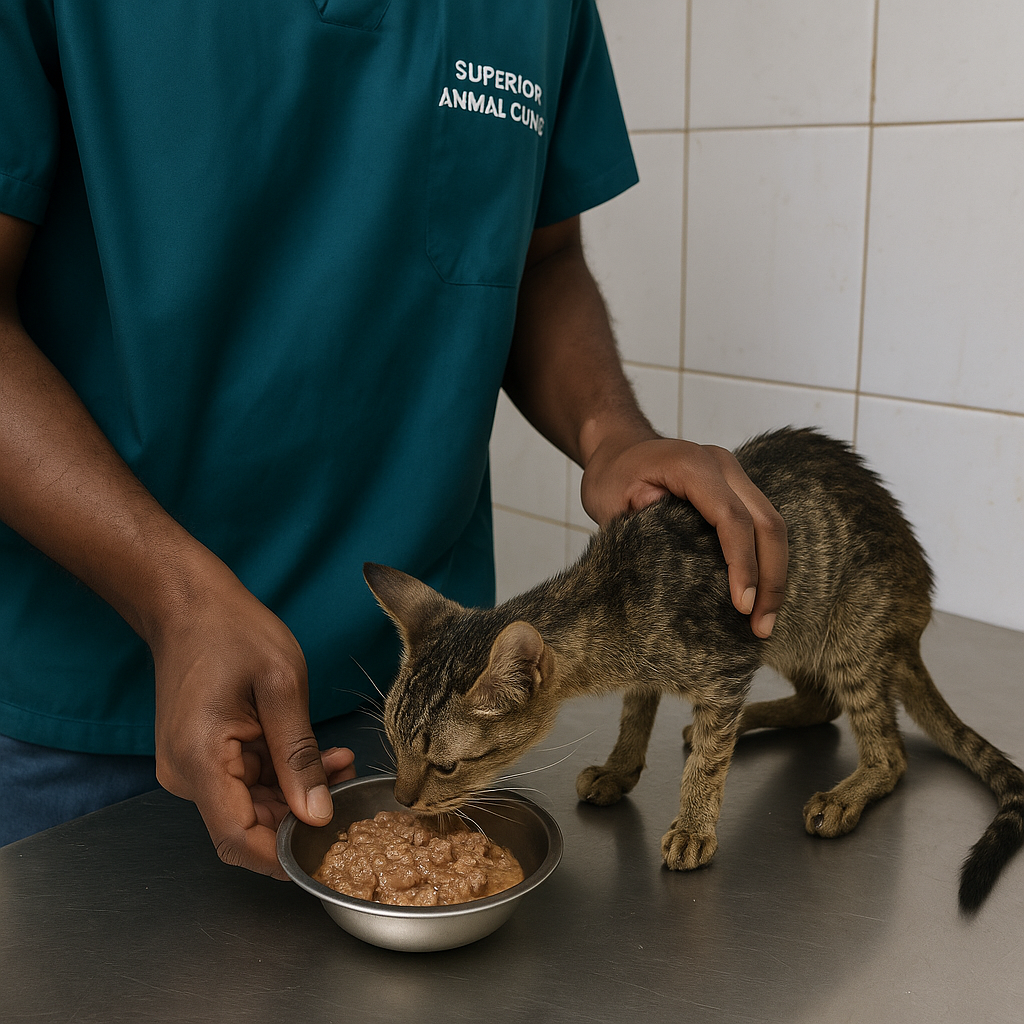
🐾 7-Day Feeding Plan for Cats With Weight Loss in Kampala
Important Notes Before You Start
- Always serve food plain (no salt, spices, oil, or onions/garlic — these are toxic to cats).
- Provide fresh drinking water daily.
- Feed small, frequent meals (3–4 times/day) instead of one big portion.
- If your cat refuses food, try warming it slightly to release the aroma.
- Continue deworming and vet checkups at Superior Animal Clinic, Makindye, for best results.
Day 1
Breakfast: Whiskas wet food (1 sachet, chicken flavor)
Lunch: Boiled tilapia fillet (boneless, shredded)
Dinner: Boiled rice mixed with small pieces of boiled chicken
Day 2
Breakfast: Reflex cat dry food (soaked in a little warm water for softness)
Lunch: Boiled beef liver (small portion, finely chopped)
Dinner: Whiskas wet food (fish flavor) + a teaspoon of plain scrambled egg
Day 3
Breakfast: Whiskas dry food (small portion, free feeding)
Lunch: Boiled goat meat (soft, small cubes) with a little fish broth
Dinner: Boiled chicken breast (shredded) with a spoon of soft posho
Day 4
Breakfast: Bolt cat food (dry, soaked in warm water if needed)
Lunch: Boiled tilapia or Nile perch (boneless, plain)
Dinner: Reflex canned wet food + boiled egg yolk (mashed and mixed)
Day 5
Breakfast: Whiskas wet food (beef flavor)
Lunch: Boiled chicken liver + soft mashed rice
Dinner: Small serving of Royal Canin Recovery (if available) or Whiskas wet food
Day 6
Breakfast: Power Cat dry food (with a splash of warm fish broth to soften)
Lunch: Boiled chicken (drumstick meat, shredded)
Dinner: Boiled goat meat or beef with soft posho (small amount)
Day 7
Breakfast: Reflex dry food + scrambled egg (plain)
Lunch: Boiled tilapia fillet with a teaspoon of boiled pumpkin (mashed)
Dinner: Whiskas wet food (any flavor) + shredded boiled chicken
✅ Weekly Tip: Rotate meals so your cat doesn’t get bored. Mix a little wet food with local proteins for extra taste and calories. If your cat still refuses food or continues losing weight, visit Superior Animal Clinic immediately for diagnosis and treatment.
FAQs About Cat Weight Loss in Kampala
Q1: Why is my cat losing weight in Kampala even though it is eating?
A: If your cat is losing weight despite eating, it could be due to intestinal parasites, diabetes, hyperthyroidism, or infections. At Superior Animal Clinic in Makindye, we run full tests to identify the exact cause and provide effective treatment for cats in Ntinda, Bugolobi, Kololo, Muyenga, Nsambya, Katwe, Zana, and surrounding areas.
Q2: What are the common causes of cat weight loss in Uganda?
A: The most common causes include worms, poor diet, infections, kidney or liver disease, diabetes, stress, dental problems, and cancer. Our experienced veterinarians help cat owners from Old Kampala, Kasubi, Makindye, Buziga, Munyonyo, Nakawa, Rubaga, and Naguru identify and treat these conditions.
Q3: How can I prevent my cat from losing weight in Kampala?
A: Preventing weight loss involves:
- Regular deworming and parasite control
- Feeding high-quality, protein-rich diets (locally available foods like chicken, fish, liver, and safe cat food brands)
- Routine veterinary check-ups at Superior Animal Clinic, Makindye
- Keeping your cat stress-free and vaccinated
Q4: Which is the best veterinary clinic in Kampala for cat weight loss treatment?
A: Superior Animal Clinic in Makindye along Salaama Road is trusted by cat owners from Ntinda, Kololo, Bugolobi, Muyenga, Makindye, Nakasero, and all Kampala neighborhoods. We provide thorough examinations, accurate diagnosis, safe medications, and personalized nutrition plans for cats struggling with weight loss.
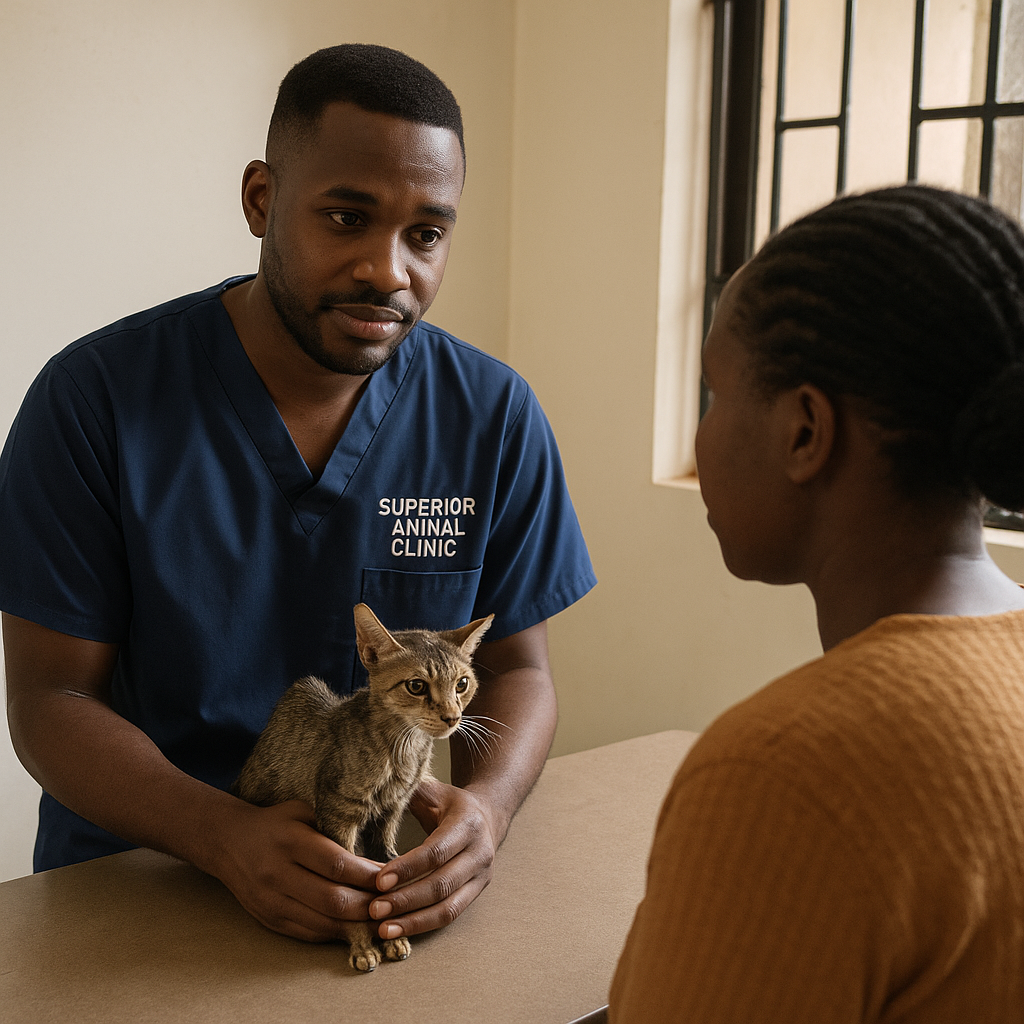
Q5: Can home remedies help a cat that is losing weight in Uganda?
A: Mild appetite loss can be supported with boiled chicken, fish, eggs, or soft posho. However, persistent weight loss requires veterinary care to rule out serious illnesses. Superior Animal Clinic provides safe, evidence-based treatments for all cats in Kampala.
Q6: What foods should I feed a cat losing weight in Kampala?
A: Feed a combination of:
- Locally available proteins: boiled chicken, beef, goat meat, liver, tilapia
- Commercial cat foods available in Uganda: Whiskas, Reflex, Bolt, Power Cat, and imported brands like Royal Canin or Hill’s (if accessible)
- Small, frequent meals and fresh water daily
Q7: What are the early warning signs of weight loss in cats?
A: Look out for:
- Visible rib or spine bones
- Loss of appetite
- Lethargy or weakness
- Poor coat condition
- Vomiting or diarrhea
At Superior Animal Clinic, we advise cat owners to act quickly when these signs appear.
Q8: Is weight loss more common in certain areas of Kampala?
A: Yes, outdoor cats in areas like Katwe, Kasubi, Mutundwe, and Ndejje often lose weight due to parasites and infections. Older indoor cats in Kololo, Muyenga, Bugolobi, and Naguru may lose weight due to chronic illnesses. Superior Animal Clinic treats cats from all Kampala neighborhoods.
Q9: How quickly can cats regain weight after treatment?
A: Recovery depends on the underlying cause. Cats with worms or dietary deficiencies may improve within 1–2 weeks, while chronic illnesses may take longer. At Superior Animal Clinic, we provide tailored treatment and follow-up to ensure cats regain healthy weight safely.
Q10: How do I book a cat weight loss consultation in Kampala?
A: You can call or visit Superior Animal Clinic in Makindye along Salaama Road, Kampala. Our friendly veterinary team will provide a comprehensive check-up, diagnostic tests, treatment plan, and feeding advice for your cat.
Q11: Can stress cause my cat to lose weight in Kampala?
A: Yes, cats are very sensitive to changes in their environment. Moving homes, loud neighborhoods, or introducing new pets can cause stress-induced appetite loss, leading to weight loss. Our vets at Superior Animal Clinic, Makindye guide cat owners on creating a stress-free environment for recovery.
Q12: Are older cats more prone to weight loss in Uganda?
A: Absolutely. Senior cats in areas like Kololo, Muyenga, Naguru, and Bugolobi are more prone to weight loss due to kidney disease, thyroid problems, dental issues, or cancer. Early veterinary check-ups can significantly improve their health and longevity.
Q13: How often should I take my cat for a weight check in Kampala?
A: For adult cats, we recommend a weight check every 3–6 months, and for cats that are losing weight, weekly monitoring may be needed until they regain healthy weight. At Superior Animal Clinic, we track your cat’s progress carefully.
Q14: Can dehydration make my cat lose weight?
A: Yes. Cats that are not drinking enough water may lose weight and become weak. We advise providing clean, fresh water daily and, if needed, supplementing with hydrating broths. Severe dehydration requires IV fluids administered at Superior Animal Clinic, Makindye.
Q15: Can parasites still affect indoor cats in Kampala?
A: Definitely. Even indoor cats can pick up worms, fleas, or ticks brought in on clothing or other pets. Regular deworming and parasite control are essential to prevent weight loss.
Q16: Can medications cause weight loss in cats?
A: Some medications, including certain antibiotics or steroids, can temporarily affect appetite. If your cat loses weight while on treatment, bring them to Superior Animal Clinic for a check-up.
Q17: Is rapid weight loss in cats an emergency in Uganda?
A: Yes. Rapid weight loss, especially when accompanied by vomiting, diarrhea, or lethargy, can indicate a serious underlying illness. Immediate veterinary attention at Superior Animal Clinic, Makindye is crucial.
Q18: What appetite stimulants are safe for cats in Kampala?
A: Our vets may prescribe mirtazapine or cyproheptadine in controlled doses to encourage eating, along with dietary and supportive care. Always consult a vet before giving any medicine.
Q19: Can cat weight loss be reversed at home without a vet?
A: Minor appetite dips may improve with home feeding remedies like boiled chicken, eggs, or fish. However, persistent or unexplained weight loss cannot be safely reversed at home. Professional diagnosis at Superior Animal Clinic is necessary.
Q20: How long does it take for a cat to regain weight after treatment in Kampala?
A: Recovery depends on the cause. Cats with worms or dietary deficiencies may gain weight within 1–2 weeks, while chronic illnesses like kidney or liver disease may take longer. We provide tailored feeding and medical plans to speed recovery safely
Q21: Can dehydration cause weight loss in cats?
A: Yes. Cats that are not drinking enough water can become dehydrated, lose weight, and develop weakness. At Superior Animal Clinic, Makindye, we provide IV fluids and hydration support for cats across Ntinda, Kololo, Bugolobi, Muyenga, Makindye, and surrounding areas.
Q22: How do I know if my cat is underweight or just slim?
A: Check for visible ribs, spine, and hip bones. Cats losing weight often appear thinner than usual, have reduced muscle mass, and may act weak. Our vets at Superior Animal Clinic perform precise weight and body condition scoring.
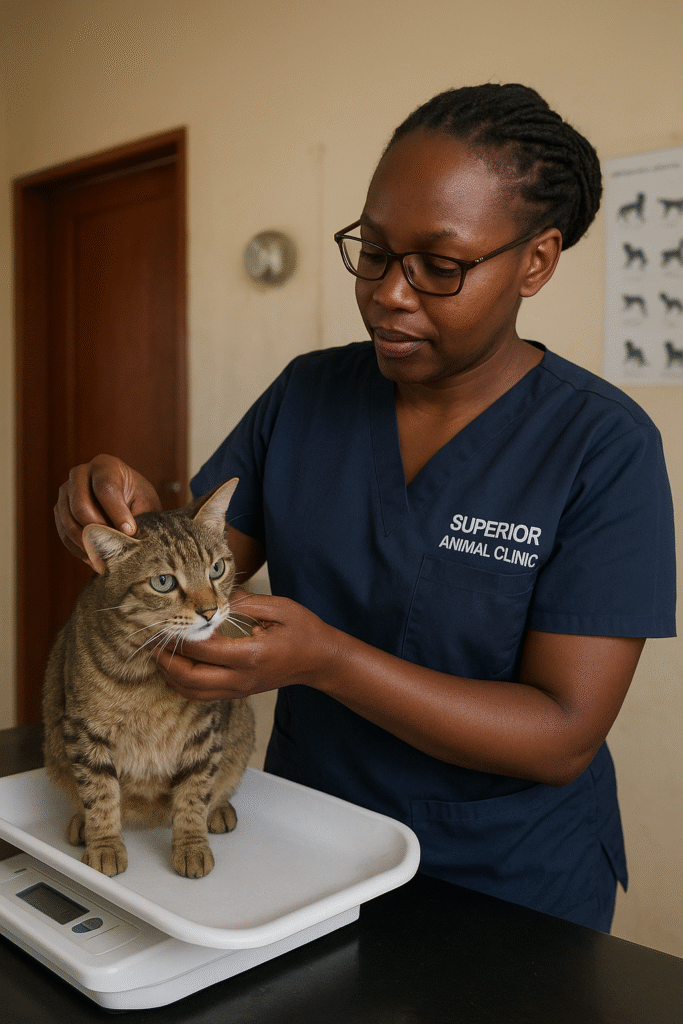
Q23: Are kittens in Kampala more prone to weight loss?
A: Yes. Kittens are vulnerable to worms, infections, and nutritional deficiencies, especially in areas like Katwe, Kasubi, and Mutundwe. Early veterinary care ensures healthy growth and prevents serious weight loss.
Q24: Can stress from moving houses make a cat lose weight?
A: Definitely. Cats in Kampala may experience stress-induced anorexia when relocating or being exposed to loud environments. We advise gradual adjustments and appetite stimulants at Superior Animal Clinic, Makindye.
Q25: What vaccines help prevent diseases that cause weight loss?
A: Vaccines for Feline Leukemia Virus (FeLV), Feline Panleukopenia, and Rabies protect cats from serious infections that can lead to weight loss. Superior Animal Clinic provides full vaccination services in Kampala.
Q26: Can flea and tick infestations cause my cat to lose weight?
A: Yes. Severe infestations drain nutrients and can lead to anemia and weight loss. We provide safe flea and tick treatments for cats from Ntinda, Bugolobi, Makindye, and all Kampala neighborhoods.
Q27: How do I safely monitor my cat’s weight at home in Kampala?
A: Use a digital pet scale or regular weighing at home. Track weekly changes and report any loss to Superior Animal Clinic, Makindye for early intervention.
Q28: Can home remedies completely cure weight loss in cats?
A: No. While boiled chicken, fish, or eggs can support appetite, persistent weight loss requires vet diagnosis and treatment at Superior Animal Clinic.
Q29: Are indoor cats safe from weight loss issues in Kampala?
A: Not entirely. Indoor cats may still lose weight due to stress, chronic illness, poor diet, or hidden parasites. Routine checkups at Superior Animal Clinic are recommended.
Q30: When should I bring my cat to Superior Animal Clinic for weight loss?
A: Bring your cat immediately if you notice:
- Rapid or unexplained weight loss
- Loss of appetite
- Lethargy or weakness
- Vomiting or diarrhea
Our clinic in Makindye provides full diagnostics, treatment, and nutrition plans for cats across Kampala.
Why Choose Superior Animal Clinic for Cat Weight Loss Treatment in Kampala?
- Experienced veterinary team.
- Full diagnostic tests and modern equipment.
- Affordable treatment packages.
- Convenient location along Salaama Road, Makindye.
- Trusted by cat owners from Ntinda to Lubowa, Kololo to Mityana.
👉 If your cat is losing weight, don’t wait. Visit Superior Animal Clinic in Makindye, Kampala, today for the best veterinary care in Uganda.

Man, login pages… the bane of my existence! Thankfully, BetPKLogin was pretty smooth. No crazy glitches, got in without a hitch. Hopefully stays that way! Check it out if you need to: betpklogin
I don’t think the title of your article matches the content lol. Just kidding, mainly because I had some doubts after reading the article.
Your article helped me a lot, is there any more related content? Thanks!